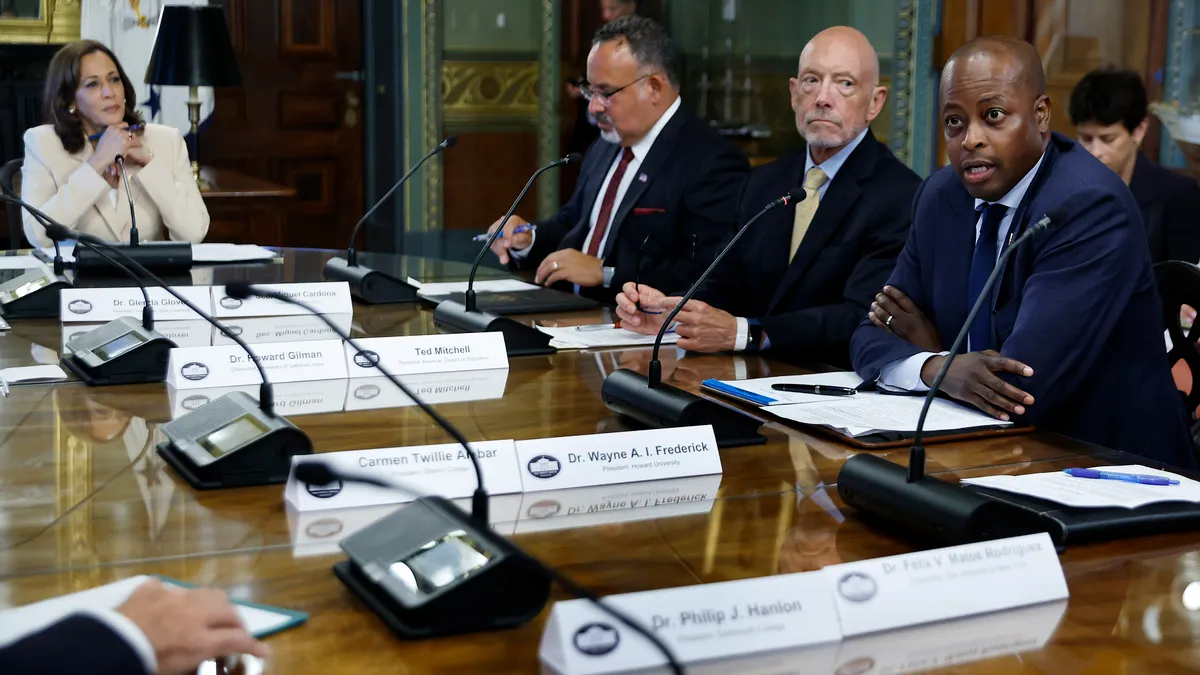Dive Brief:
- A group of college leaders were at the White House on Monday to discuss the U.S. Supreme Court's decision this summer to overturn the constitutional right to an abortion.
- They told Vice President Kamala Harris about concerns affecting students and their campuses' operations, such as how families traveling across state lines will navigate different laws affecting reproductive healthcare. They also flagged an increased burden on those who have been sexually assaulted and concerns about how their own medical schools and hospitals will adapt.
- Harris highlighted response ideas like flexible attendance and leave policies, emergency funds and bolstered privacy policies for students seeking care.
Dive Insight:
Many college leaders objected in June after the Supreme Court's ruling in Dobbs v. Jackson Women’s Health Organization overturned the longstanding right to abortion established by Roe v. Wade in 1973. Lawyers have since flagged the decision as creating major issues for colleges to address.
Monday's appearance at the White House gave higher ed sector leaders a new stage to discuss the way the decision is reverberating on campuses as the fall term gets underway.
"The clock is ticking on every campus and every university in America to figure out what can and cannot be done to support students, faculty and staff," said Ted Mitchell, president of the American Council on Education, a top higher education lobbying group.
Harris said people should be trusted to make "the most intimate decisions" for themselves and said fallout from the case will affect those of college-going age specifically. For example, women who work and juggle academic responsibilities will likely struggle to leave class and travel to receive an abortion, she said.
Carmen Twillie Ambar, president of Oberlin College, in Ohio, made a similar point. Ambar said the court’s decision "disproportionately impacts women of lesser means who are, more often than not, women of color."
Ambar also called for the higher ed sector to lead the conversation going forward.
"Higher education has a responsibility to help America conduct a more civil dialogue about a woman's right to make decisions about her own healthcare, and, dare I say, equity itself," Ambar said.
Glenda Glover, president of Tennessee State University, a historically Black institution, said the decision gave tremendous power back to the states.
"Students must understand that and become more active in voting at various levels, at the state level, and understand the issues that are out there," Glover said. "Let your state representatives hear from you. They want to hear from students."
Félix V. Matos Rodríguez, chancellor of the City University of New York system, said LGBTQ students and employees are "understandably very fearful of the potential loss of their rights that have been gained over generations."
College leaders also expressed concern about the way the decision will affect their medical schools and hospitals.
"The training becomes more complicated," said Dr. Wayne A. I. Frederick, president of Howard University, an HBCU in Washington, D.C., with a college of medicine and hospital. "The burden we have to carry to ensure that underrepresented women are protected and are given expert care with due diligence is one that we see as something we have to be at the forefront of."
The University of California, Irvine, Medical Center expects a surge in out-of-state patients seeking reproductive care, said Howard Gillman, chancellor at the university.
"We are very worried about the existing legal protections for our out-of-state patients, and especially for our out-of-state students who use our student health facilities," Gillman said.















